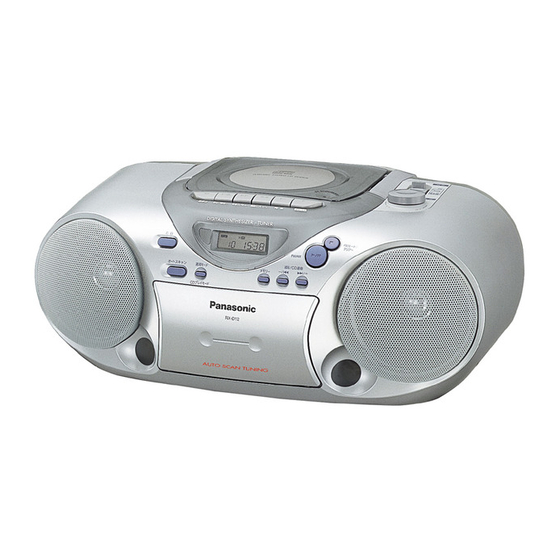Panasonic RXD15 - RADIO CASSETTE W/CD 사용 설명서 - 페이지 6
{카테고리_이름} Panasonic RXD15 - RADIO CASSETTE W/CD에 대한 사용 설명서을 온라인으로 검색하거나 PDF를 다운로드하세요. Panasonic RXD15 - RADIO CASSETTE W/CD 9 페이지. Portable stereo cd system
Panasonic RXD15 - RADIO CASSETTE W/CD에 대해서도 마찬가지입니다: 사용 설명서 (9 페이지), 사용 설명서 (9 페이지)

Using headphones
Turn down the volume and
connect the headphones to
the [PHONES] jack.
Plug type: 3.5 mm (1/8˝) stereo
Note
Avoid listening for prolonged
periods of time to prevent hearing
damage.
Maintenance
Cleaning inside the deck
Clean the heads regularly to assure good quality playback and recording.
Use a cleaning tape (not included).
Care of the CD lens
Clean the lens regularly to prevent malfunctions.
Use a blower to remove dust and a cotton swab
if it is extremely dirty.
Recommended product:
Lens cleaner kit (part no. SZZP1038C).
CAUTION!
THIS PRODUCT UTILIZES A LASER.
USE OF CONTROLS OR ADJUSTMENTS OR PERFORMANCE OF
PROCEDURES OTHER THAN THOSE SPECIFIED HEREIN MAY
RESULT IN HAZARDOUS RADIATION EXPOSURE.
DO NOT OPEN COVERS AND DO NOT REPAIR YOURSELF.
REFER SERVICING TO QUALIFIED PERSONNEL.
CAUTION:
TO PREVENT ELECTRIC SHOCK MATCH WIDE
BLADE OF PLUG TO WIDE SLOT, FULLY INSERT.
WARNING:
TO REDUCE THE RISK OF FIRE, ELECTRIC SHOCK
OR PRODUCT DAMAGE, DO NOT EXPOSE THIS
APPLIANCE TO RAIN, SPLASHING, DRIPPING OR
MOISTURE.
CAUTION: TO REDUCE THE RISK OF ELECTRIC
SHOCK, DO NOT REMOVE SCREWS.
NO USER-SERVICEABLE PARTS INSIDE.
REFER SERVICING TO QUALIFIED
SERVICE PERSONNEL.
The lightning flash with arrowhead symbol, within
an equilateral triangle, is intended to alert the user
to the presence of uninsulated "dangerous voltage"
within the product's enclosure that may be of
sufficient magnitude to constitute a risk of electric
shock to persons.
The exclamation point within an equilateral triangle is
intended to alert the user to the presence of important
operating and maintenance (servicing) instructions in
the literature accompanying the appliance.
(not included)
PHONES
Lens
6
RQT5685
PRECAUTIONS
Before using this unit please read these operating instructions carefully.
Take special care to follow the warnings indicated on the unit itself as well
as the safety suggestions listed below.
Afterwards keep them handy for future reference.
Safety
1. Power Source—The unit should be connected to power supply only
of the type described in the operating instructions or as marked on
the unit.
2. Polarization—If the unit is equipped with a polarized AC power plug
(a plug having one blade wider than the other), that plug will fit into
the AC outlet only one way. This is a safety feature. If you are
unable to insert the plug fully into the outlet, try reversing the plug. If
the plug should still fail to fit, contact your electrician to replace your
obsolete outlet. Do not defeat the safety purpose of the polarized
plug.
3. Power Cord Protection—AC power supply cords should be routed
so that they are not likely to be walked on or pinched by items
placed upon or against them. Never take hold of the plug or cord if
your hand is wet, and always grasp the plug body when connecting
or disconnecting it.
4. Nonuse Periods—When the unit is not used, turn the power off.
When left unused for a long period of time, the unit should be
unplugged from the household AC outlet.
Installation
Environment
1. Water and Moisture —Do not use this unit near water—for example,
near a bathtub, washbowl, swimming pool, or the like. Damp
basements should also be avoided.
2. Condensation—Moisture may form on the lens in the following
conditions...
¡ immediately after a heater has been turned on.
¡ in a steamy or very humid room.
¡ when the unit is suddenly moved from a cold environment to a
warm one.
If moisture forms inside this unit, it may not operate properly. To cor-
rect this problem, turn on the power and wait about one hour for the
moisture to evaporate.
3. Heat—The unit should be situated away from heat sources such as
radiators and the like. It also should not be placed in temperatures
less than 5°C (41°F) or greater than 35°C (95°F).
Placement
1. Ventilation—The unit should be situated so that its location or position
does not interfere with its proper ventilation. Allow 10 cm (4 " ) clearance
from the rear of the unit.
2. Foreign Material—Care should be taken so that objects do not fall
into and liquids are not spilled into the unit. Do not subject this unit to
excessive smoke, dust, mechanical vibration, or shock.
3. Magnetism—The unit should be situated away from equipment or
devices that generate strong magnetic fields.
4. Stacking—Do not place heavy objects, other than system
components, on top of the unit.
5. Surface—Place the unit on a flat, level surface.
6. Carts and Stands—The unit should be used only with
a cart or stand that is recommended by the manufacturer.
The unit and cart combination should be moved with
care. Quick stops, excessive force, and uneven surfaces
may cause the unit and cart combination to overturn.
7. Wall or Ceiling Mounting—The unit should not be mounted to a
wall or ceiling, unless specified in this operating instructions.
